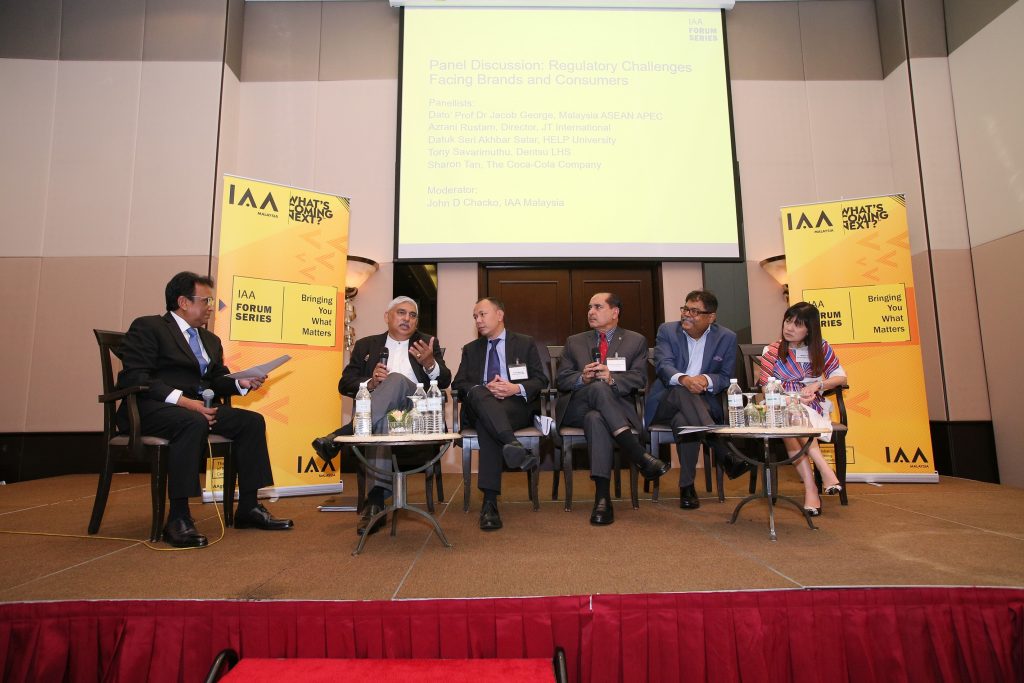In a bid to engage regulators constructively on several hot button and regulatory issues facing stakeholders from brand owners to consumers, the International Advertising Association (IAA) Malaysia hosted a highly engaging forum yesterday.
Themed ‘Regulatory Challenges Facing Brands and Consumers’, the forum featured a distinguished panel of subject matter experts from global, regional and national levels, across various related sectors. These include regulators, industry practitioners and legal eagles.
Hosted at Eastin Hotel, the event, which is part of IAA’s Forum Series, is being held for the first time in an Asia Pacific country, and featured a Keynote Address by Malaysia’s Honourable Deputy Minister of Domestic Trade and Consumer Affairs, YB Tuan Chong Chieng Jen.
In his welcome address, IAA Malaysia President, John D. Chacko opened up a discussion to ponder on ways to create market-friendly policies, which both respect and empower consumers, brand owners, manufacturers, marketers and governments alike.
“This will enhance and strengthen government relations with industries, while building greater trust amongst all parties,” he said, adding that he welcomes the government’s support to engage in a constructive dialogue with thought leaders, industry players and marketers alike, at the forum and beyond.
Among the international presenters and panellists were Seth Hays, Chief Representative, Asia-Pacific International Trademark Association; Samir Dixit, Managing Director, Brand Finance Asia Pacific; and Mike Ridgway, Director, Consumer Packaging Manufacturers Alliance.
Chacko underlined the fact that brands have a responsibility to all constituents, including the consumers.

“Brand owners must exercise responsibility in their business philosophy by delivering practices that meet 360-degree expectations, and not wait or depend on a black and white from regulators,” he said.
As a strong advocate of industry self-regulation, IAA Global has long supported the International Chamber of Commerce (ICC) Code as the “gold standard” for marketing self-regulation principles.
For eight decades now, the Code provides global benchmarks, encouraging high standards and ethical marketing practices, while providing valuable guidance to both regulators and self-regulatory bodies globally.
Nonetheless, Chacko pointed out that consumer education is key in addressing the underlying and brewing issues, allowing consumers, who are getting more exposed by the day to happenings and knowledge around the world, to use their mind on how to spend their money.
“The proper channel is to give brand owners and consumers a voice through a grounded analysis-based dialogue that leads to informed choice,” he said.
Chacko said that Intellectual Property (IP) laws and frameworks are avenues of constructive channels to protect and enforce the interests of rights holders, whilst at the same time, allowing consumers the freedom to make well-informed choices.
The forum provided an opportunity for an in-depth assessment and understanding of the regulatory environment and its impact on brands in Malaysia and in international markets.
“Data and dialogue have such a profound impact on decisions in the normal course of regulatory matters,” he said, adding that the forum was an avenue for honest and constructive analysis on the ramifications of ‘over regulatory’ efforts. He opined that though well-meaning, these efforts, if not tackled well, can inadvertently impede the consumer’s freedom of choice.
Socio-cultural and ethical questions arising from the disruption of existing regulations by new technologies will impact regulations in brand building, and all players, including consumers, will have to brace themselves for change, not through force, but through consensus.
“Advocacy by industry bodies such as the IAA, brand owners, and regulatory bodies is critical, and the solution is to work in collaboration with genuine stakeholders to address issues regarding the regulations in branding and promotion,” Chacko said.
Intelligent opinions on how to manage different roles by different players, will in the immediate and long-term future, determine a fair balance between commercial interest of brands and the social interests such as consumer protection.
Some of the areas addressed in the one-day forum include trademark rights and regulatory encroachment, brand risks in 21st century and how extreme regulation can favour illegal trade. The forum also featured several case studies and trends on regulating brands.
MARKETING Magazine is not responsible for the content of external sites.










